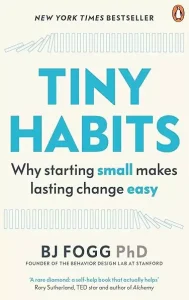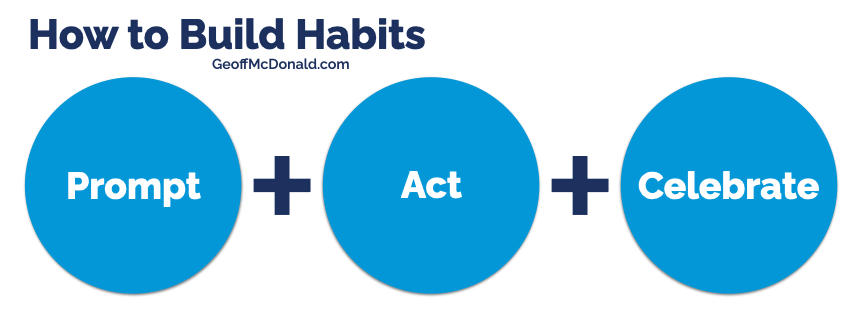Being on autopilot is seen as a bad thing. We usually relate it to laziness, lack of caring, and lack of motivation.
Not good, right? Well, maybe. Have you ever considered that being on auto-pilot was the key to success?
Did you know that 40% of your daily actions are habits, not decisions?
That means you are on autopilot 40% of the time. And that also means your habits are 40% responsible for your long-term success.
Why You Need to Build Habits
The key to this approach is to use this naturally occurring brain saver to your advantage.
In other words, you need to build the right habits.
I’ve been threatening to write more books. Especially, the 9 half-written ones.
But lately, I’ve not even been writing at all. Barely a word. This was frustrating and a little depressing.
I realised I was great at goal-setting but lousy at goal-achievement. Thankfully, I’m not fatally flawed (at least I don’t think so). But I was going about completing my goals the wrong way.
Previously, I shared four problems with the way you pursue goals.
The alternative is to build habits.
This is what I’m currently working on. But how do you do this?
Thankfully there is a proven strategy for how to build habits that stick. And this is vital to build momentum and make lasting changes in your life.
For me, that means completing my Life’s Work by writing my books. For you, that might mean eating well, going to the gym regularly, being well-read or anything else that will make your life a wonderful thing.
 How do you build good habits?
How do you build good habits?
First, you need to meet Professor BJ Fogg. He’s the father of habits, a professor of Behavioural Design at Stanford and the author of this brilliant book, Tiny Habits. (The best book I’ve read on habits!)
Much of what you read about how habits work is based on his work.
Habit Building Step 1: What action should you take?
The first step in building a lasting habit is to decide what action to take.
But if you’re not specific about this, then you will fail to build a lasting habit.
I want to write books. And the obvious action that I need is to sit down and write. That’s a good general action to take. But how specifically can I build a habit based on this?
I know from experience that I write best sitting at my desk at my computer. Slogging away for hours in a row is not for me. But doing short sharp sprints does work well. So that’s what I’ll build my habit around.
Fortunately, I don’t have to make up a new strategy, I can simply employ the Pomodoro Method. I had dabbled with this in the past and found that it worked for me. This time I want to build as a daily habit.
 What is the Pomodoro Method?
What is the Pomodoro Method?
The Pomodoro Method is based on 25-minute sessions of focused work followed by a five-minute break. You then repeat four sessions over two hours to complete one block.
At the start of each session, you set a timer for 25 minutes and you work on one thing only until the buzzer rings. The key is to not be distracted during this time. That means no spontaneous coffee breaks or toilet visits (keep them to the break). And it means you don’t answer your phone either.
For me, this means, once I set the timer, I will write for 25 minutes. I will then take a five-minute break away from my desk and then do it all again.
I wrote a more complete description of the Pomodoro Method here.
Habit Building Step 2: When will you take action?
The second step in building a lasting habit asks the question: When?
When are you going to do your habit?
One of the big reasons you fail to build good habits is that you’re not specific enough about when you do them.
This is why I’ve failed with my writing. Some days I write and some days I don’t. As a result, it’s no surprise I don’t finish my books.
What is a Habit?
By definition, a habit is a triggered behaviour. Something happens and you react in a particular way.
For instance, when you are tired and find yourself walking past the fridge you might find yourself automatically opening the door to look for ice cream. (I know I do.)
Alternatively, as soon as I sit in my car, I automatically put my seat belt on.
When is the best time to do your habit? For me, the easiest way to write is to do it first thing in the morning. Get out of bed. Walk to my desk. Start my computer. Open Notion. Start Writing. This is when my brain is on full energy and I have fewer distractions to manage.
Thus, the first part of my habit is to be sitting at my desk at 8 am every morning. An easy trigger here is to set an alarm a few minutes before this to remind me.
And at 8 am I can set my timer for 25 minutes to start my first writing block.
Note: You might find when you build your habits that you need to stack several together to make it all work.
Habit Building Step 3: How do you wire this into your brain?
The third step in building a lasting habit is the best bit.
The reason you want to build a habit is to take your desired action with less effort – to be on auto-pilot.
For me, I want my writing to be automatic – I don’t want to think about having to write, I just want it to happen.
To achieve this you must wire the habit into your brain. But how do you do that?
The good news is that it’s easier and more fun than you think.
What do you do when you win in life? Or when your favourite team kicks the winning goal?
You celebrate. And this sends a signal to the brain that says ‘That was fun’ and as a result, you’ll want to do more of that!
The Best Way to Celebrate Your Success
But to wire your habit into your brain you have to do this the right way.
I love champagne. But popping the cork and having a guzzle is not the best way to wire a habit into your brain.
There are two important parts to consider: timing and emotion.
First, as they say in the classics, timing is everything. You want to celebrate as soon as you complete your habit goal. Not one minute later. And not two minutes later. But as soon as you finish.
This tells your brain – that thing I just did, that’s what I’m celebrating.
Second, you might have noticed that many of the things you remember about your life were emotional events. This might be the joy you had at your wedding. Or the sadness you felt when someone close to you passed away.
Yes, we often think our brains are built on logic and rational thought. But, our emotions play a big part in deciding what is important and what is not.
This is why you need to celebrate emotionally completing your habit.
Three Elements of a Habit-Building Celebration
But how do we do that? There are three basic building blocks.
- Facial expression – Putting a big smile on your face is often the simplest and most powerful emotional response you can make. Or put on a happy face.
- Body Action – This could be a posture you hold, eg Wonder Woman (see the Amy Cuddy video below) or Victory Salute (hands raised above your head). Or it could be an action you perform, like a fist pump or clapping your hands together.
- Voice or Words – Next is something you say and how you say it. A loud ‘Yes’ might do it. Or perhaps ‘go girl’ or ‘brilliant’. Have some fun with this and find your master habit celebration words. Remember to say it an exaggerated way to heighten the emotional impact. (Note, if you’re in public you might simply mouth this rather than saying it out loud.)
For bonus points and the best results, do all three at once. For instance, a big smile, fist pump and loud ‘yes’.
(Feel free to practice this right now. Go on. Have fun with this.)
Final Habit Building Tips
Naturally, to build a lasting habit, you need to practice your habit often.
Remember, building habits is a journey, not a sprint. It’s about progress, not perfection.
It’s the consistency over time that makes the difference. Start small and slowly and steadily build your habit one day at a time.
For me, I simply have to write every day. That’s how I’ll finish writing my books. I don’t have to think about tomorrow or next week. All I have to do is complete my habit today – and celebrate when I do.
And it’s the same for you – transform your life one habit at a time.
More on How to Build Habits
If you want more details on how to build habits then check out these posts next:
- Everyone tells you to set goals. But this is better.
- The Four Levels of Business Purpose – Where Do You Fit?
- The Ultimate Guide to Planning Your Life’s Work

 How do you build good habits?
How do you build good habits? What is the Pomodoro Method?
What is the Pomodoro Method?


